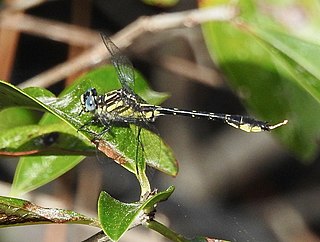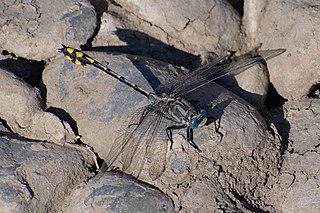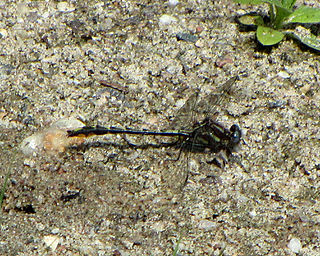Stenogomphurus consanguis, the Cherokee clubtail, is a species of clubtail dragonfly in the family Gomphidae. It is endemic to the southeastern United States, found in small rivers and streams.
Phanogomphus diminutus, the diminutive clubtail, is a species of clubtail dragonfly in the family Gomphidae. It is endemic to the southeastern United States. Its natural habitats are boggy trickles and slow, small streams and lakes, all with part sand, part silt bottoms, and Sphagnum moss margins.

Hylogomphus geminatus, the twin-striped clubtail, is a species of dragonfly in the family Gomphidae. It is endemic to the southeastern United States, and is found in small rivers and streams.

Phanogomphus hodgesi, the Hodges' clubtail, is a species of clubtail in the family of dragonflies known as Gomphidae. It is found in Alabama, Florida, Louisiana, and Mississippi along the gulf coast of the United States.

Gomphurus lynnae, the Columbia clubtail, is a species of clubtail dragonfly in the family Gomphidae. It is found in western North America, with most known populations in Columbia River tributaries.
Gomphurus modestus, the Gulf Coast clubtail, is a species of dragonfly in the family Gomphidae. It is endemic to the southeastern United States, and is found in medium to large, slow-flowing rivers over rock, mud and sand substrates.
Phanogomphus sandrius, the Tennessee clubtail, is a species of clubtail dragonflies in the family Gomphidae. It is found in the United States, in nine locations of central Tennessee.
Gomphurus septima, or Septima's clubtail, is a species of clubtail dragonflies in the family Gomphidae.

Gomphus is a genus of clubtail dragonflies in the family Gomphidae.

Phanogomphus quadricolor, the rapids clubtail, is a species of dragonfly in the family Gomphidae. It is found in eastern North America. Its natural habitat is medium to large rivers. It is threatened by degrading habitat quality.

Phanogomphus exilis, the lancet clubtail, is a species of dragonfly in the family Gomphidae widespread and common throughout southern Manitoba, Ontario, and the northeastern United States.

Phanogomphus is a genus of clubtails in the family Gomphidae found in North America. There are about 17 described species in Phanogomphus.

Stylogomphus albistylus, the eastern least clubtail, is a species of dragonfly in the family Gomphidae. It is typically found in North America, particularly in the Appalachians and eastward. It can also be found in the states of Ohio, Michigan, and Wisconsin.

Stylurus spiniceps, the arrow clubtail, is a species of clubtail in the dragonfly family Gomphidae. It is found in North America.

Stylurus scudderi, the zebra clubtail, is a species of clubtail in the dragonfly family Gomphidae. It is found in North America.
Stenogomphurus is a genus of clubtails in the family of dragonflies known as Gomphidae. There are at least two described species in Stenogomphurus, both found in North America.

Gomphurus is a genus of clubtails in the family of dragonflies known as Gomphidae. There are about 13 described species in Gomphurus.

Hylogomphus is a genus of clubtails in the family of dragonflies known as Gomphidae. There are about six described species in Hylogomphus.

Gomphurus gonzalezi, the Tamaulipan clubtail, is a species of clubtail in the family of dragonflies known as Gomphidae. It is found along the lower Rio Grande in the United States, and across the border into Mexico. It is known only in one state in the United States (Texas) and one state in Mexico.

Phanogomphus militaris, the sulphur-tipped clubtail, is a species of clubtail dragonfly in the family Gomphidae. It is found in central North America.














